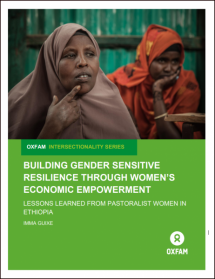Building Gender Sensitive Resilience through Women’s Economic Empowerment Lessons Learned from Pastoralist Women in Ethiopia
The paper explores how the overlap of a double marginalized identity produces particular disadvantages for pastoralist women in Ethiopia, and how the Oxfam intervention in the Somali region addresses the connection between these disadvantages and poverty and power.
The Oxfam intervention in the Somali region addressed the connection between pastoralist women’s disadvantages and poverty and power through four main strategies, based on the assumption that the advancement on women’s rights would be a logical step after achieving a better economic and social position and condition in Somali communities.
These strategies were:
- Raising awareness, building capacities, and educating women and girls
- Mobilizing and organizing pastoralist women
- Engaging new key stakeholders (traditional and religious leaders, youth, etc. in women’s issues
- Providing sustainable and effective livelihoods alternatives
Source: Oxfam
Date of Publication: March 10, 2021
SIMILIAR RESOURCES
Tools
Examples
- Women's Economic Empowerment and Domestic Violence: Links and lessons for Practitioners Working with Intersectional Approaches
- Re-politicizing Intersectionality: How an Intersectional Perspective can Help International Non-governmental Organizations be Better Allies to Women's Rights Movements
- Gender Implications for Extension and Advisory Services during COVID-19
- Gender Norms, Intersectionality and Social Protection: In Conversation with UNICEF's Dr Zahrah Nesbitt-Ahmed
- Intersectionality: Reflections from the Gender & Development Network
- Three Lessons on Sparking Behavior Change through Interpersonal Communication
- The (re)solve Project
- Lessons Learned from an Integrated Approach for Reaching First-time Young Parents in Nigeria
- COVID-19: Emerging Gender Data and Why it Matters
- From Global Coordination to Local Strategies A Practical Approach to Prevent, Address and Document Domestic Violence under COVID-19 Briefing Paper
- The Reality of Intersectional Factors in Gender Inequality
- Tracing Change in Female Genital Mutilation/Cutting through Social Networks: An Intersectional Analysis of the Influence of Gender, Generation, Status, and Structural Inequality
- Integrating Intersectionality in Work with Lesbian Women, Bisexual Women and Transwomen in Zimbabwe
- Arab Women Speak Out: Profiles of Self Empowerment
- Tostan Community Empowerment Program

